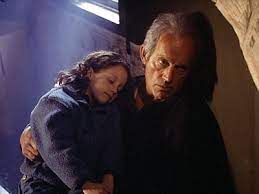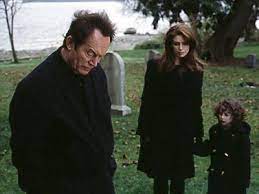Directed by Thomas J. WrightWritten by Michael Duggan
Air Date: October 2, 1998
New Cast Member Debit: Klea Scott (Special Agent Emma Hollis)
Guest Stars: Ken Pogue (Tom Miller); Peter Outerbridge (Special Agent Barry Baldwin); Stephen E. Miller (Assistant Director Andy McClaren)
The second season of Millennium ended on the grimmest note imaginable. As a deadly virus appeared to be spreading everywhere, Frank Black took refuge with his family in the mountains, only to see his wife Catherine succumb to the disease. Faced with a tragic dilemma, Frank gave the vaccine to his daughter Jordan, saving her life.
But with the series unexpectedly renewed for a third season, the two-part premiere had a lot of explaining to do.
For the most part, "The Innocents" and "Exegesis" succeeded in telling an ambitious story tying up some lose ends from the previous season and setting the stage for the new season with the Millennium Group set up as the antagonists - and Frank determined to stop them.
The episode begins in a house as an old woman utters, "it has begun." Then we move to a commercial jet and follow a young woman into the bathroom where she finds a gun, shoots the ceiling, causing a fatal crash that kills over 100 passengers.
Meanwhile, the scene shifts to the DC Metro area where Frank has relocated with Jordan. Catherine's parents are helping out, but her father Tom blames Frank for her death. For it's revealed the Marburg Virus was contained to the Pacific Northwest, so it was not the apocalyptic event everyone feared. Life has returned to business as usual. Frank is back working with the FBI where he's something of a legend, but he's lost in grief and his therapist advises him to take things slowly.
At the crash site, the FBI is investigating the event as a crime. We're introduced to Special Agent Emma Hollis, who will become Frank's partner. The ambitious lead investigator, Special Agent Baldwin, believes it was a simple case of sabotage by a disgruntled employee. Frank begins experiencing visions of the crash and offers his assistance, where he and Hollis discover evidence linking the crash to mothers and daughters who all look similar - and the Marburg Virus.
If it all sounds a bit convoluted, you're not alone. Frank's superior, Assistant Director McClaren, finds it hard to believe to believe as well. A string of further incidents, a gas explosion in Salt Lake City, where the victim are also a blonde mother and daughter, the mother confesses at the hospital they are being targeted by the Millennium group for unspecified reasons, and provides information about the next target. Frank and Emma pursue the lead, only to witness a fatal car accident with another mother and daughter.
There's almost a Final Destination vibe to the episode with all the freak accidents being orchestrated. The machinations of the plot do force some mental gymnastics, but the steadiness of the direction and sheer assurance of seeing Frank and Jordan (and the addition of Klea Scott) provides a strong foundation for a new season.







